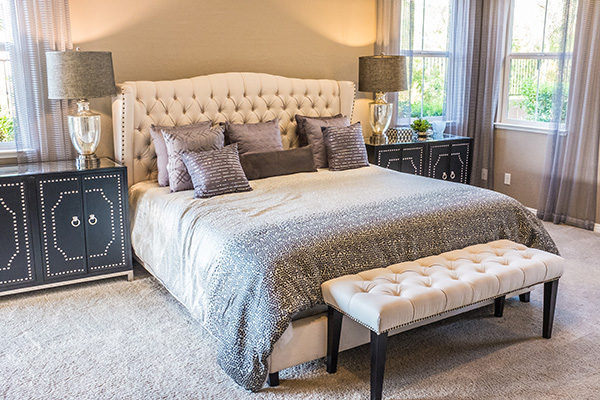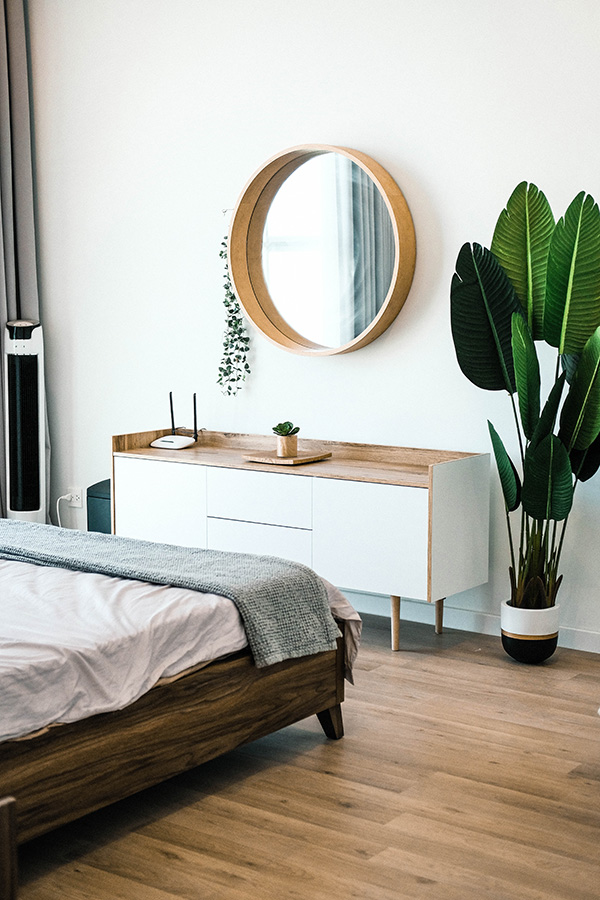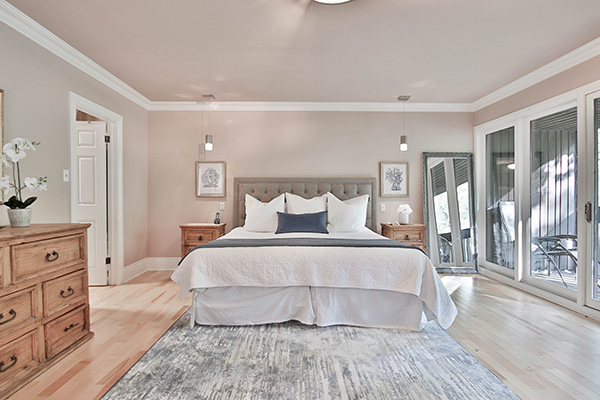Bedrooms are more than just places to sleep; they are sanctuaries of comfort, solace, and rejuvenation. We spend a significant portion of our lives in these intimate spaces, and so they profoundly impact our overall well-being. This is where the ancient practice of Feng Shui comes into play, offering us a transformative approach to harmonizing our living spaces and enhancing our lives.
In this blog post, we will explore the intriguing realm of Feng Shui and how you can utilize its principles to craft a sacred and sensual space. Whether you're a long-time believer in the power of Feng Shui principles or a newcomer curious about this ancient Chinese art, this guide will help you transform your bedroom into a tranquil oasis where you can recharge, relax, and rejuvenate.
What Is "Good" Feng Shui
Feng Shui is an ancient Chinese system of beliefs and practices that revolve around the organization and positioning of your surroundings to enhance harmony, equilibrium, and a favorable energy flow. The term "Feng Shui" translates to "wind and water" in English, embodying the concept that the organization of objects and the movement of energy in your environment can impact your well-being and life experiences.
According to Feng Shui experts, the key principles of Feng Shui include:
Chi (Qi): Central to the practice of Feng Shui is the notion of Chi, representing the vital life force energy that flows through all things. Properly arranging your environment is believed to ensure the free and well-balanced flow of Chi, which can enhance various aspects of your life.
Bagua Map: A Feng Shui consultant employs the Bagua Map to divide a space into nine zones, each of which is linked to distinct life areas, including wealth, relationships, career, and health. Properly activating and balancing these zones can improve corresponding aspects of your life.
Yin and Yang: The balance of Yin (passive, dark, and feminine energy) and Yang (active, bright, and masculine energy) is crucial in Feng Shui. Attaining a balanced energy between these forces in your environment contributes to creating a harmonious atmosphere.
Five Elements: Feng Shui incorporates the five elements of wood, fire, earth, metal, and water. These elements are strategically employed in interior design and decor to establish a harmonious and balanced space.
Furniture Placement: Positioning furniture and objects within a space plays a crucial role in Feng Shui. Correct placement is designed to enhance energy flow and cultivate a feeling of balance and harmony.
Colors: The choice of colors in your environment can impact the energy in a space. Feng Shui advises using specific colors to promote different qualities and emotions.
What Is The Ideal Feng Shui Bedroom Layout?
For homeowners, a Feng Shui bedroom layout offers an opportunity to transform their sleeping space into a haven of balance and rejuvenation. Designing a Feng Shui bedroom involves strategically positioning the bed, ensuring a clear view of the bedroom door while avoiding direct alignment with it. Emphasizing symmetry in furnishings, minimizing clutter, and choosing calming colors create a tranquil environment. By incorporating these principles, homeowners can cultivate a harmonious atmosphere that enhances sleep and improves overall well-being. A Feng Shui bedroom layout infuses positive energy into your home, creating a sanctuary where you can recharge, relax, and find serenity in your own personal retreat.

Tips for a Balanced Feng Shui Bedroom
Bed Placement
With Feng Shui guidance, bed placement is a pivotal aspect of bedroom design. The bed, regarded as the central element, profoundly influences the flow of energy within the Feng Shui bedroom.
The optimal arrangement revolves around the "commanding position," where the bed offers a clear view of the bedroom door without being in direct alignment with it. This positioning, endorsed by Feng Shui principles, symbolizes safety, control, and mastery.
From a Feng Shui perspective, positioning your head southward during sleep is believed to harness the earth's natural energies, potentially improving sleep quality and overall well-being. Make sure to have a solid wall behind your solid headboard. This ancient practice underscores the importance of aligning personal energy with the environment, promoting a restful night's sleep.
Orienting your head southward promotes a sense of grounding, vitality, and emotional equilibrium, facilitating a more rejuvenating sleep experience. It's viewed as a way to awaken a feeling connected to the earth's magnetic field, fostering personal harmony and a peaceful night's rest. While Feng Shui principles can vary, this orientation provides a straightforward yet meaningful approach to optimizing energy flow in your bedroom.
Balance and Symmetry
Striving for balance and symmetry in your bedroom layout can create a sense of visual and energetic harmony. Symmetrical furniture arrangements, such as having two bedside tables, table lamps, or artwork on either side of the bed, can create a feeling of equilibrium and order within the space. Artwork and furniture should also be positioned with equal space on all sides to allow energy to flow freely in a balanced and symmetrical way around the room. This sense of balance can extend to other aspects of your life, promoting a more stable and harmonious existence.
Clutter-Free Space
A clutter-free environment is essential in Feng Shui. Clutter disrupts the flow of energy, or Chi, in your bedroom and can create feelings of chaos and stagnation. It's crucial to keep your bedroom tidy and organized, using storage solutions to hide away items that don't belong in this space. A clear, unobstructed energy flow allows for a smoother, more positive life journey. This includes the space underneath your bed or bedside table!
Incorporate Feng Shui-Friendly Color Scheme
The choice of colors in your Feng Shui bedroom is another critical consideration. Feng Shui recommends employing soothing, calming colors and earthy tones that encourage relaxation and tranquility. Soft blues, muted greens, warm neutrals, and gentle pastels can create a serene atmosphere that supports restful sleep and emotional well-being.
Use Natural Materials
Incorporating earth tones and natural materials in your bedroom decor, such as wood, cotton, and linen, is believed to enhance positive energy flow. These materials are associated with nature's grounding and healing properties, creating a connection to the earth's energy that can promote physical and emotional well-being.
Limit Bedroom Electronics
Electronics, such as televisions and computers, disrupt the peaceful energy of the bedroom. Electric and magnetic fields can disrupt sleep patterns and impact overall well-being. It's advisable to remove or minimize the presence of electronic devices in your bedroom to create a more harmonious environment.
Art And Decor
The art and decor in your bedroom should hold personal significance and resonate with positive energy. Surround yourself with items that inspire and uplift your spirit. Meaningful artwork, decor, and objects can infuse your sleep space with intention and purpose, contributing to a sense of emotional well-being.
Avoid adding artwork depicting oceans, fountains, rivers, etc., as they give off too much energetic yang energy and should be kept outside the bedroom.

Add Green Plants
With the guidance of a certified Feng Shui consultant, indoor plants can play a vital role in enhancing air quality and infusing your bedroom with the revitalizing energy of nature. On the other hand, adding too much vibrant life energy into the space can be too much energy.
When balanced with good ventilation, these green companions help maintain a steady flow of fresh, clean air, promoting physical well-being and mental clarity while preventing excess energy.
Lighting
The presence of natural light in your bedroom is vital for creating a welcoming ambiance. Thoughtful lighting choices can greatly affect the atmosphere in your bedroom. Soft, ambient lighting can establish a cozy and inviting atmosphere while avoiding harsh, overhead lighting is advisable. Consider using dimmer switches to adjust the lighting intensity to suit different moods and activities, such as reading or meditation.
Personal Energy
Ultimately, it's crucial to acknowledge that rigid rules do not bind good Feng Shui but rather function as a flexible framework that should harmonize with your individual energy and preferences. Your bedroom ought to mirror your distinct identity and aspirations, and the guidance of Feng Shui experts can help you achieve this. Trust your instincts and collaborate with these experts to make adjustments that deeply resonate with your comfort and overall well-being, ensuring that your living space truly manifests your personal essence and intentions.

Feng Shui Bedrooms Do And Don'ts
Do's:
Command Position for Bed: Place the bed in the "commanding position" with a clear view of the bedroom door, but not directly in line with it. This placement symbolizes safety and control. Place the bed against a solid wall.
Balance and Symmetry: Aim for balance and symmetry in your bedroom layout. Symmetrical arrangements, such as matching nightstands and lamps on both sides of the bed, create harmony. Not only should items be balanced, but space should as well. Leave equal room on all sides of a piece of furniture.
Clutter-Free Space: Maintain a tidy and organized bedroom. Clutter can disrupt the flow of Chi and create a sense of chaos. Utilize storage solutions to keep your environment clutter-free.
Calming Colors: Choose soothing colors like soft blues, muted greens, warm neutrals, or gentle pastels to create a peaceful atmosphere conducive to sleep.
Natural Materials: Incorporate natural materials in your furniture and decor, such as wood, cotton, and linen, to enhance the flow of positive energies. Use soft bedding, and opt for bed linens made from natural fibers.
Good Air Quality: Ensure good ventilation in the room to promote fresh, clean air. Indoor plants can also contribute to enhancing air quality.
Art and Decor with Meaning: Use artwork, decor, and objects with personal significance and positive symbolism. Surround yourself with items that inspire and uplift your spirits.
Don'ts:
Bed Placement Issues: Avoid placing the bed directly under heavy beams, sloped ceilings, or oppressive overhead structures, as they can create a feeling of pressure and discomfort.
Bedroom Electronics: Remove or minimize electronic devices such as TVs and computers in the bedroom, as they disrupt sleep patterns and create electromagnetic fields that can affect well-being.
Clutter and Chaos: Clutter is a major Feng Shui don't. Keep your bedroom clutter-free, as it can hinder positive energy flow and create a threatening energy. This includes the space underneath your bed!
Dark and Overwhelming Colors: Avoid using dark or overwhelming colors that make the bedroom feel heavy and suffocating. Balance is crucial for establishing a harmonious atmosphere.
Mirrors Facing the Bed: Don't place mirrors directly facing the bed. Such items can generate restless energy and disrupt sleep. Some experts consider this to be extremely bad Feng Shui.
Excessive Plants: While plants can be beneficial, don't overcrowd the bedroom with too many! It can create a chaotic atmosphere.
Uncomfortable or Damaged Furniture: Remove uncomfortable or damaged furniture from the bedroom, as it can create negative energy. Surround yourself with pieces that promote comfort and relaxation.
Books: Books carry active energy, stimulating the mind. Tall and imposing bookshelves radiate constrictive energy. Leave one book on the bedside table at the side of the bed, and then store the rest of your books out of your bedroom.

